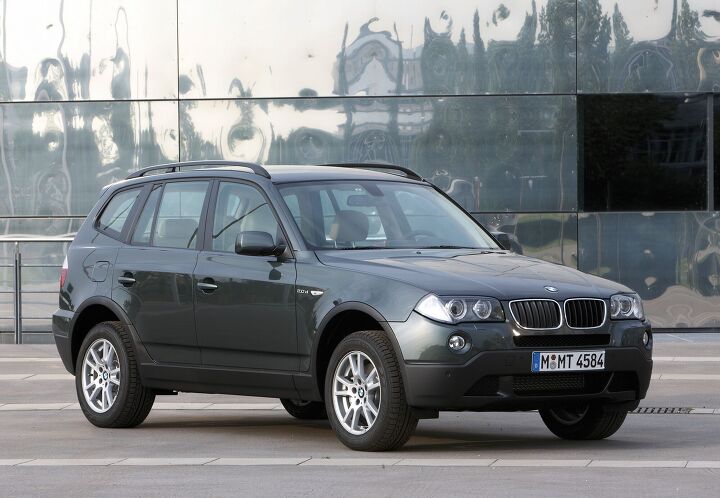BMW Accused of Emissions Cheating, Does Anyone Really Care?

Regulators in Germany have opened an investigation into alleged diesel exhaust rule circumvention on the part of BMW. Claims have been made that the automaker used an illegal defeat device on select models to achieve lower tailpipe emissions during testing. It’s a situation reminiscent of the Volkswagen Dieselgate scandal from 2015. However, government regulators have been on the offensive ever since — roping in loads of manufacturers and leaving a subset of the public wondering whether modern emission laws are even tenable.
The Kraftfahrt-Bundesamt (KBA), Germany’s federal transport authority, has alleged that BMW X3 models equipped with the brand’s 2.0-liter diesel motor contain software designed to skirt emission regulations. According to German outlet Bild, the issue stems from a difference in emissions based upon the status of the HVAC system.
Regulators are concerned that software may have been designed to intentionally emit less nitrogen oxides when the air-conditioning system is switched off. This reportedly matters because federal testing usually remains deactivated, leading to suspicion that BMW used this as a window to skirt regulations. But that seems like an oversimplification of the situation.
Due to the improved aerodynamics associated with driving with the windows up, combustion vehicles typically see improved fuel economy at highway speeds while running the air conditioner. This should also translate to lower emissions over time. However, the inverse is true at low speeds or idle because of the extra strain added by the compressor. It’s not unusual to see reduced carbon dioxide emissions when a vehicle isn’t running the A/C.
The investigation follows an earlier report issued by German environmental group Deutsche Umwelt Hilfe (DUH), which stated the BMW X3 2.0d possessed an illegal defeat device that allowed vehicles to pollute more under certain conditions. Accusations were thrown that BMW’s diesel motor saw a larger drop in emissions when the vehicle’s A/C was switched off than usual, suggesting that it could be the result of software malfeasance — comparing it to what happened with Volkswagen’s diesel vehicles years earlier.
“It is shocking that even more than seven years after the diesel scandal became known, we are detecting the highest nitrogen oxide emissions we have measured to date in diesel vehicles in real driving conditions and are finding shutdown devices in the engine control software,” DUH’s Federal Managing Director Jürgen Resch stated in German.
However, things aren’t that simple. Jürgen has been a professional environmental lobbyist since the 1980s and Deutsche Umwelt Hilfe has taken major criticisms for endorsing driving bans, carbon credits, and targeting stringent emissions laws at the expense of what’s reasonably achievable. Jürgen himself has likewise been faulted as one of the many high-profile climate activists that have utilized private jets. There’s also a lot of political tension due to how the DUH is organized — especially in regard to its ties to the government, despite claiming status as an NGO.
The organization receives funding from the American ClimateWorks Foundation, the European Commission and the German federal government as part of an EU-wide campaign to reduce pollution. It has similarly taken heat for campaigning for the advancement of diesel particulate filters in 2005 after accepting donations from the very same companies that manufacture them. It even went out of its way to endorse specific brands, calling into question how objective it truly was as an influential environmental watchdog.
DUH has likewise received funding from automakers and occasionally partnered with companies on certain programs. While several have cut ties in more recent years (e.g. Daimler and Toyota), the organization continues to receives criticism for claiming to be a non-profit.
Still, the above doesn’t automatically mean the group hasn’t uncovered emissions cheating on the part of BMW. Its investigation into Volkswagen Group helped uncover software manipulation that had the vehicle’s running lean spending on wheel positioning (indicating that it was operating on a test rig). So there’s reason to believe it might have uncovered similar shenanigans here.
But it also played a role in killing demand for affordable diesel vehicles in both Europe and the United States. No matter how you slice it, Deutsche Umwelt Hilfe seems hellbent on ending diesel-based transportation and it’s difficult to overstate just how much influence it has over German regulators and the industry at large.
While BMW won’t say much about the current investigation, it did end 2023 stating it’s in contact with European authorities to clarify questions made about emissions following concerns about a specific BMW model produced between 2010 and 2014. Odds are good it was talking about the X3 with the 2.0-liter diesel.
BMW CEO Harald Krueger also previously said that the company had not manipulated any diesel engines following the initial allegations — perhaps hinting at its stance should any formal charges be pressed.
But your author is wondering whether or not anyone even cares at this point. Volkswagen was fined billions of dollars and the United States forced it into establishing a subsidiary to improve the national EV charging infrastructure. The company is known as Electrify America and it has consistently been the worst-ranked charging network in the country. VW has also struggled to effectively launch EVs as it pivoted toward electrification, despite remaining broadly profitable.
For all the effort put into emissions regulations, they arguably haven’t resulted in better automobiles. Consumer satisfaction surveys have been trending downward while prices continue to climb. Meanwhile, regulatory efforts seem focused on determining what type of vehicle you’ll be allowed to drive in the future and using regulatory fines to further shape the industry by pouring the money back into businesses that are ideologically aligned with the relevant NGOs.
Similar arguments can certainly be made about the oil industry. But it also appears to have bought into using environmentalism as a shield. Its lobbying efforts are also a little more blatant and the entities shilling for it don’t appear to have the government’s ear like they used to. The real issue is likely not which group is trying to influence policy but rather the fact that it’s happening on a corporate and/or political level. At the end of the day, too much of this just feels like a colossal waste of time and money without any noteworthy advantages trickling down to the consumer.
[Image: BMW]
Become a TTAC insider. Get the latest news, features, TTAC takes, and everything else that gets to the truth about cars first by subscribing to our newsletter.

A staunch consumer advocate tracking industry trends and regulation. Before joining TTAC, Matt spent a decade working for marketing and research firms based in NYC. Clients included several of the world’s largest automakers, global tire brands, and aftermarket part suppliers. Dissatisfied with the corporate world and resentful of having to wear suits everyday, he pivoted to writing about cars. Since then, that man has become an ardent supporter of the right-to-repair movement, been interviewed on the auto industry by national radio broadcasts, driven more rental cars than anyone ever should, participated in amateur rallying events, and received the requisite minimum training as sanctioned by the SCCA. Handy with a wrench, Matt grew up surrounded by Detroit auto workers and managed to get a pizza delivery job before he was legally eligible. He later found himself driving box trucks through Manhattan, guaranteeing future sympathy for actual truckers. He continues to conduct research pertaining to the automotive sector as an independent contractor and has since moved back to his native Michigan, closer to where the cars are born. A contrarian, Matt claims to prefer understeer — stating that front and all-wheel drive vehicles cater best to his driving style.
More by Matt Posky
Latest Car Reviews
Read moreLatest Product Reviews
Read moreRecent Comments
- El scotto No rag-top, no rag-top(s) = not a prestigious car brand. Think it through. All of the high-end Germans and Lexus have rag-tops. Corvette is really its own brand.World-leading engines. AMG, M, S and well Lexus is third-world tough. GM makes one of the best V-8s in the world in Bowling Green. But nooooo, noooo, we're GM only Corvettes get Corvette engines. Balderdash! I say. Put Corvette engines in the top-tier Cadillacs. I know GM could make a world-class 3.5 liter V-6 but they don't or won't. In the interior everything that gets touched, including your butt, has to feel good. No exceptions.Some think that those who pay above MSRP and brag about it are idiots. Go the opposite direction, and offer an extended 10-year 100,000-mile factory warranty. At a reasonable price. That's Acura's current business model.
- Carrera 2014 Toyota Corolla with 192,000 miles bought new. Oil changes every 5,000 miles, 1 coolant flush, and a bunch of air filters and in cabin air filters, and wipers. On my 4th set of tires.Original brake pads ( manual transmission), original spark plugs. Nothing else...it's a Toyota. Did most of oil changes either free at Toyota or myself. Also 3 batteries.2022 Acura TLX A-Spec AWD 13,000 miles now but bought new.Two oil changes...2006 Hyundai Elantra gifted from a colleague with 318,000 when I got it, and 335,000 now. It needed some TLC. A set of cheap Chinese tires ($275), AC compressor, evaporator, expansion valve package ( $290) , two TYC headlights $120, one battery ( $95), two oil changes, air filters, Denso alternator ( $185), coolant, and labor for AC job ( $200).
- Mike-NB2 This is a mostly uninformed vote, but I'll go with the Mazda 3 too.I haven't driven a new Civic, so I can't say anything about it, but two weeks ago I had a 2023 Corolla as a rental. While I can understand why so many people buy these, I was surprised at how bad the CVT is. Many rentals I've driven have a CVT and while I know it has one and can tell, they aren't usually too bad. I'd never own a car with a CVT, but I can live with one as a rental. But the Corolla's CVT was terrible. It was like it screamed "CVT!" the whole time. On the highway with cruise control on, I could feel it adjusting to track the set speed. Passing on the highway (two-lane) was risky. The engine isn't under-powered, but the CVT makes it seem that way.A minor complaint is about the steering. It's waaaay over-assisted. At low speeds, it's like a 70s LTD with one-finger effort. Maybe that's deliberate though, given the Corolla's demographic.
- Mike-NB2 2019 Ranger - 30,000 miles / 50,000 km. Nothing but oil changes. Original tires are being replaced a week from Wednesday. (Not all that mileage is on the original A/S tires. I put dedicated winter rims/tires on it every winter.)2024 - Golf R - 1700 miles / 2800 km. Not really broken in yet. Nothing but gas in the tank.
- SaulTigh I've got a 2014 F150 with 87K on the clock and have spent exactly $4,180.77 in maintenance and repairs in that time. That's pretty hard to beat.Hard to say on my 2019 Mercedes, because I prepaid for three years of service (B,A,B) and am getting the last of those at the end of the month. Did just drop $1,700 on new Michelins for it at Tire Rack. Tires for the F150 late last year were under $700, so I'd say the Benz is roughly 2 to 3 times as pricy for anything over the Ford.I have the F150 serviced at a large independent shop, the Benz at the dealership.


































Comments
Join the conversation
I totally care. So there!
The new on-the-road tests mandated by the EU do result in noteworthy advantages in nitrogen emissions.
This is how automakers tied themselves up in a knot: they cheated in emissions before, which led to more stringent regulation by lawmakers after air quality in cities failed to improve, and now automakers have to actually hit those more stringent targets in real-world conditions.